Supporting the regional Agri-Food ecosystem through cross-institutional collaboration
Summary: The vibrant North Brabant region has a fully-fledged innovation infrastructure that promotes collaboration and innovation. Various triple-helix network organisations and clusters operate at regional and sub-regional level. These organisations stimulate economic development with a regional and/or sectoral focus and, to this end, promote collaboration between knowledge institutions, public authorities, and the business community. The new Next Tech Food Factories (NTFF) meta-cluster, a joint initiative by AgriFood Capital and Brainport Development, addresses the specific needs of regional food processing companies, as highlighted in the region’s Agri-Food Innovation Agenda. Since its founding in early 2023, NTFF has rapidly established itself as a key-stone actor within the region’s high-tech agri-food ecosystem and developed a targeted service portfolio to foster the uptake of digitalisation in its member companies.
The North Brabant Region
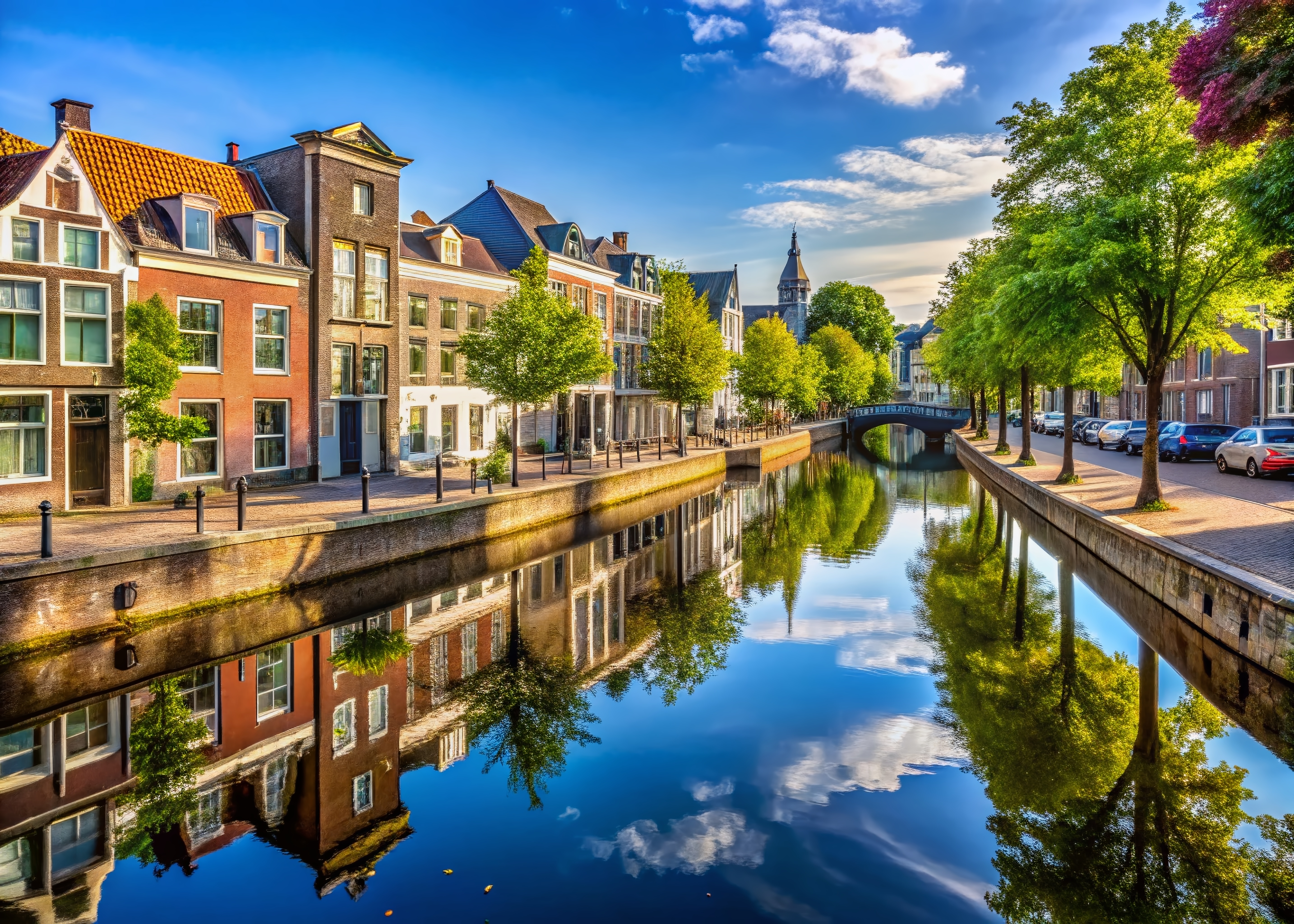
The North Brabant region (NUTS2) is the largest province in the Netherlands in terms of area, after Gelderland. Bordered by Flemish provinces of Antwerp and Limburg to the south and sharing boundaries with South Holland and Gelderland to the north, Limburg to the east, Zeeland to the west, North Brabant, with a population of approximately 2.6 million people, is one of the most economically successful provinces in the Netherlands. While a significant portion of economic activity is still located in the countryside in livestock farming and agriculture, an important economic activity is electronics industry, which developed as a spin-off of the multinational company Philips. The region hosts some 140,000 companies, ten universities and numerous leading public and private research and innovation centres, including the High Tech Campus Eindhoven, which hosts more than 12,500 innovators, researchers and engineers. The North Brabant region, and especially Brainport Eindhoven, is one of the most innovative regions in the Netherlands and in the EU. It is characterised by its high-quality manufacturing industry (including ASML), international cooperation and booming exports of goods (20% of total Dutch exports) to – among other countries – Germany, Belgium, France, the US and also China.
North Brabant is categorised as an Innovation Leader, according to the EU Regional Innovation Scoreboard 2023 (RIS 2023) Regional profiles Netherlands. Innovation performance has increased over time (9.7%).
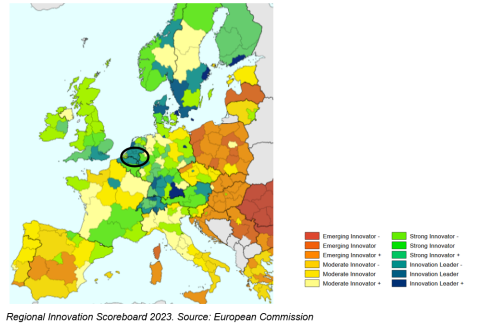
North Brabant’s strategic objectives are derived from the region’s coalition agreement and are defined in the “Executive Agenda” on Economy, Knowledge and Talent. The strategic objectives are also reflected in the South Netherland’s Regional Innovation Strategy (RIS3) 2021-2027, which covers the three provinces of Limburg, North-Brabant and Zeeland. The RIS3 is closely related to other national strategies, such as the Dutch Smart Industry roadmap, the Brainport Strategic Agenda (a framework for cooperation between the central government and the innovative Eindhoven region), as well as thematic agendas, such as the Agrifood Capital Foundation Strategic Agenda 2030. In March 2023, the five regional development organisations in North Brabant signed the Brabant Agenda 2023, focusing on closer intra-regional collaboration on the topics of AI, digitalisation, agri-food/plant-based and venture building.
The South Netherland region’s Smart Specialisation Strategy (RIS3) 2021-2027 applies a mission-oriented approach to “promote innovation aimed at both strengthening the economy and making a clear contribution towards societal transitions” (p. 27). It addresses five global societal transitions and specific challenges in South Netherlands:
- Energy transition
- Raw-materials transition
- Climate transition
- Agriculture and food transition
- Health transition
North Brabant is among the ten founding regions of the Vanguard Initiative, a unique alliance of today more than 30 of Europe’s most advanced industrial regions, focused on stimulating industrial innovation and building European value-chains based on complementarities in regional smart specialisation strategies.
To facilitate industrial transition, North Brabant builds on a strong collaborative culture.[1] The Brabant Development Agency (BOM) is the executive body of both the North Brabant region and the Dutch Ministry of Economic Affairs. BOM aims at building bridges between entrepreneurs, knowledge institutes and the government, with a particular focus on four strategic challenges: Sustainable Food Systems, a Healthy Future, Climate-neutral Energy Solutions, and Promising Key Technologies.
BOM closely coordinates its activities with the four sub-regional development and innovation promotion organisations Brainport Development, Midpoint Brabant, REWIN, and AgriFood Capital. In addition, the region benefits from a fully-fledged innovation infrastructure that promotes collaboration and innovation. Various triple-helix network organisations and clusters operate at regional and sub-regional level. These organisations stimulate economic development with a regional and/or sectoral focus and, to this end, promote collaboration between knowledge institutions, authorities, and the business community:
- PhotonDelta, a non-profit organisation supporting an end-to-end value chain for photonic chips
- Brainport Industries, a network of tier one, tier two and tier three High Tech suppliers
- RAI Automotive Industry, a leading authority in Dutch automotive manufacturing and supply chain industry
- Cluster Sports & Technology, combining the excellences of South Netherlands on sports, heathy active lifestyle, knowledge and business
- High Tech Nl, the sector organisation by and for innovative Dutch high-tech companies and knowledge institutes
- Lifeteczone, a network of Lifesciences and Medical Technology SME's in the South of the Netherlands
Funding of these networks and clusters primarily originates from regional and national funds, project funding as well as in-kind contributions from their respective members.
[1] See https://www.stimulus.nl/opzuid/wp-content/uploads/sites/4/2020/11/Regional-Innovation-Strategy-South-Netherlands-2021-2027-English.pdf
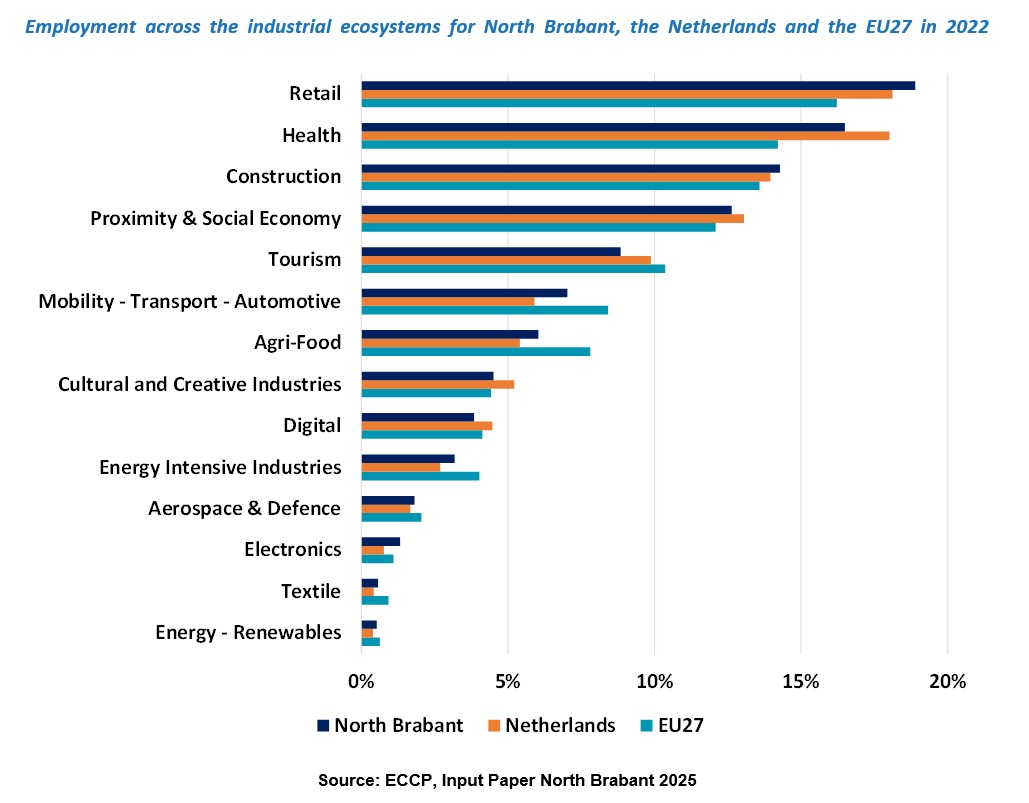
The regional economy of the North Brabant region encompasses a wide range of industrial ecosystems[1] with the retail ecosystem standing out as the largest in terms of employment, followed by the health and construction ecosystems (see figure below). The significance of the electronics sector is underscored by the Electronics ecosystems' performance, which surpasses the Dutch and EU27 averages in employment.
[1] As per definition of the EU’s Industrial Strategy (March 2020).
North Brabant boasts a thriving agri-food ecosystem, with the entire value chain present – from growers and primary producers to processing plants and logistics companies. Its strategic location within Europe enhances its appeal, attracting major industry players and fostering seamless trade and distribution. The region is home to a robust food production and processing industry, featuring renowned companies such as Danone/Nutricia, LambWeston/Meijer, and Can-Pack. Collaborative efforts between businesses, universities (Brabant’s central location connects leading food technology universities like Wageningen, Delft, and Ghent), and government bodies have led to innovative partnerships, such as the Green Protein Excellence Center.
North Brabant also benefits from well-developed agri-food clusters, campuses, and shared facilities, including AgriFood Capital, Foodtech Park Brainport, the Green Chemistry Campus, and the Jamfabriek, which provide essential infrastructure for research and innovation. Additionally, leading knowledge institutions such as HAS green academy, Wageningen University and Research (WUR), Eindhoven University of Technology (TU/e), and Jheronimus Academy of Data Science (JADS) contribute to cutting-edge advancements in food technology. The region hosts fully developed food production value chains, covering key sectors such as the processing of potatoes into French fries and starch, as well as dairy production for various products, including specialised baby foods.
Collaboration among these multiple actors is based on a regional Agri-Food Innovation Agenda, with a thematic focus on:
- Plant-based smart farming
- Animal-based smart farming
- Protein transition
- Combating waste and residual stream utilisation
- Food of the future
This unique combination of resources, expertise, and collaboration cements North Brabant's status as a powerhouse in the European food industry.[1]
[1] See https://brabantisbright.nl/5-most-promising-agrifood-start-ups-in-brabant/
AgriFood Capital
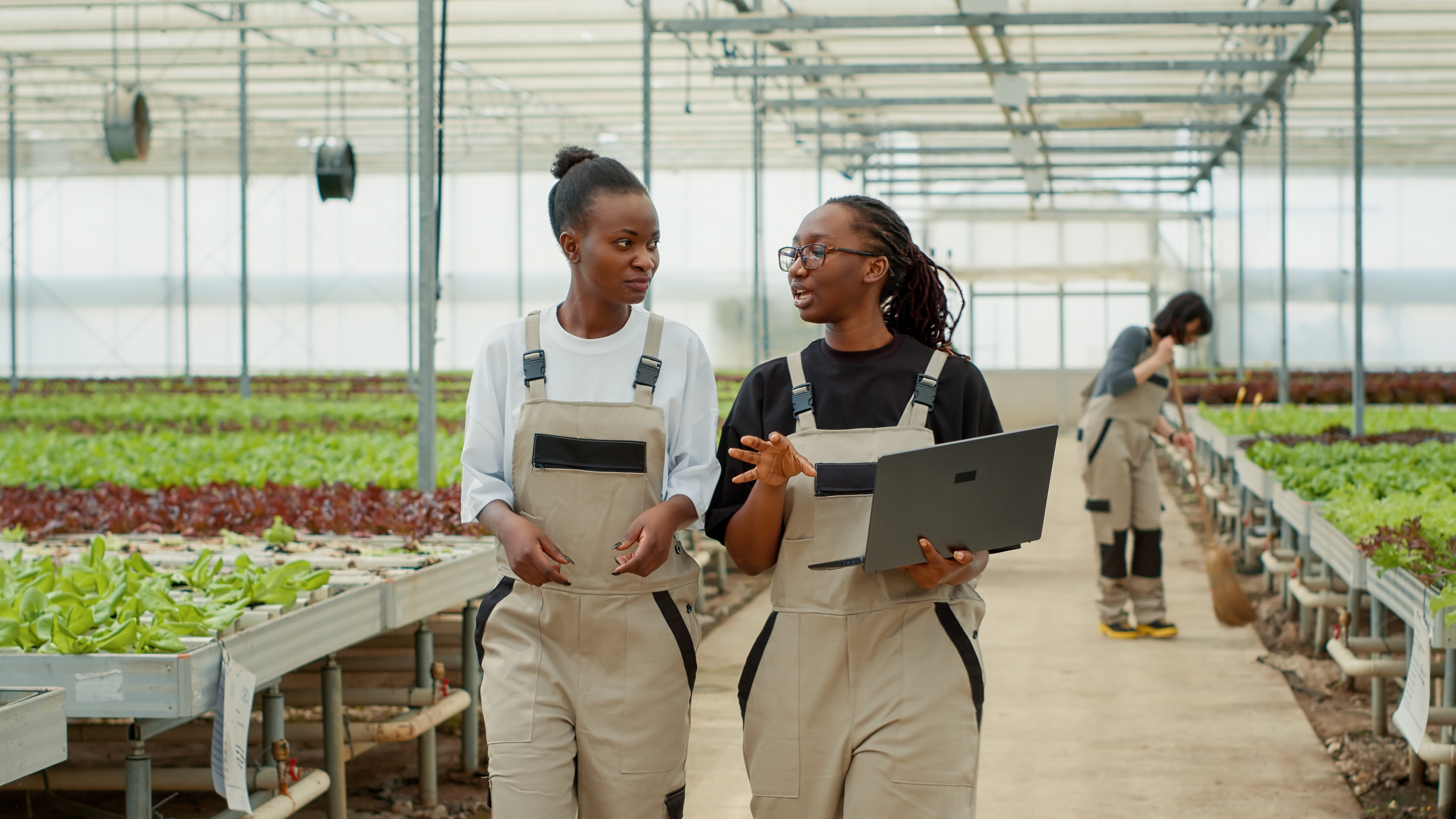
The 's-Hertogenbosch-based AgriFood Capital cluster offers a platform for industry, public authorities and knowledge institutes in North-East Brabant for pooling their diverse resources and achieve innovation and growth in agri-food. Founded in 2015, the cluster’s main objective is to “develop smart regional solutions for global agri-food challenges.” Aiming at creating a unique, powerful agri-food ecosystem in North-East Brabant, the cluster facilitates to the knowledge, coaching, network and funding required to reach this objective.
AgriFood Capital, which is organised as a limited liability company, counts about 200 members; they all come from different categories, namely industry (including Large Enterprises, Small and Medium Enterprises, as well as start-ups), research (5 universities, 2 research institutes), 3 training and education providers and more than 60 intermediaries and political/administration stakeholders. The cluster management team consists of 7 well-qualified staff members (5.2 full time equivalents (FTE)), while the governance is entrusted to a strategic board consisting of leading personalities of the agri-food and high tech sector. Funding for the cluster organisation is solely generated through public sources, in particular funding from 17 regional councils and the North Brabant Province as well as EU project funding. There are no membership fees.
Work of the cluster management is based on a sound cluster strategy (“AGRIFOOD CAPITAL FOUNDATION STRATEGIC AGENDA 2030”) covering five strategic challenges:
- Human capital: lifelong learning
- Entrepreneurship: strong start, robust growth
- Knowledge and innovation: new knowledge, new business
- Networks and clusters: ‘local buzz’ and ‘global pipelines’
- Communication and positioning: a powerful story
Until December 2022, AgriFood Capital carried the BRONZE label of the European Cluster Excellence Initiative (ECEI).

In March 2024, AgriFood Capital joined forces with the Eindhoven-based economic development agency Brainport Development to stimulate the application of the latest technologies in the food processing industry, with the support of the North-Brabant region.
The Brainport region is a leader when it comes to the development of the latest technologies such as artificial intelligence (AI), robotics and sensor technology. However, these technologies are not always applied in the food processing industry. By engaging in cross-institutional collaboration, the two new partners seized the opportunity to make processes more efficient and sustainable. They also expect the use of robotics to help solve the shortage of workers and improve working conditions in companies.
All of this required more intensive cooperation between the agri-food and high-tech sectors, especially in the development and testing phase. As a result, the two bodies formed the new meta-cluster Next Tech Food Factories (NTFF), which closely cooperates with 50 to 75 regional (and national) partners (companies, universities, branch organisations, intermediaries, clusters), thereby acting as a bridge between both worlds. In the spirit of the Brabant Agenda 2023, both organisations thereby contributed to the agenda’s objective, “a stronger and borderless Brabant”.
Digital and green industrial transition are core objectives of the new collaboration initiative. In order to achieve these goals, Next Tech Food Factories supports companies in their innovation processes, among other things, with innovation vouchers, coaching, training, and access to an excellent knowledge network throughout Europe. More precisely, the cluster offers the following services:
- Business support for companies in innovation processes
- Regional and EU Networking
- Providing a test infrastructure by collaborating with a network of with lab facilities (NTFF pays per use)
- Coordinating project applications and implementation
- Identifying Cascade Funding opportunities
- Strategic communication and awareness raising on food processing innovations (marketing)
- Contributing to local and regional strategy development
Since its founding in early 2023, NTFF has rapidly established itself as a key-stone actor within North Brabant’s agri-food ecosystem. The cluster is fully dedicated to fostering the uptake of digitalisation in the companies of the regional agri-food ecosystem. NTFF is active both at regional and European levels in funded projects related to specific digitalisation objectives, in particular, the Dutch NXTGEN Hightech programme with a €450 million funding line from the National Growth Fund. At the European level, the cluster actively participates in projects under different EU policy programmes, such as I3, Horizon Europe (in particular, the European Innovation Ecosystems (EIE) programme) or Digital Europe.
Main vehicle for the cluster’s project activities is its involvement in the Thematic Smart Specialisation Partnership “Smart Solutions 4 Agri-food”, which builds on the expertise of 40+ partners (clusters and research centres) from 17 regions dedicated to support the digital transformation of the agri-food industry. Here, NTFF is actively involved in SIXFOLD, Food_scalEUp and the “enHancing dIgital and Green growtH in the Food processing industry via Interregional innoVation invEstments” (HIGHFIVE) sub-projects. Moreover, NTFF is an active contributor to the South Netherlands European Digital Innovation Hub (EDIH) “Klikopmorgen“.
The young NTFF meta-cluster has set ambitious goals to measure its impact on regional industrial transition. As for the year 2025, NTFF aims to i) support over 50 companies in advancing their innovation journey, helping them become more resilient, sustainable, and resource-efficient through awareness initiatives, financial assistance, and opportunities for testing and validation; ii) test and validate more than 5 new technologies in collaboration with member companies; iii) organise more than 10 events contributing to building awareness of deep tech and its applications in food processing; iv) facilitate more than €5 million in new funding for companies; and v) document more than 5 successful innovation implementations.
Lessons Learned and Transferability
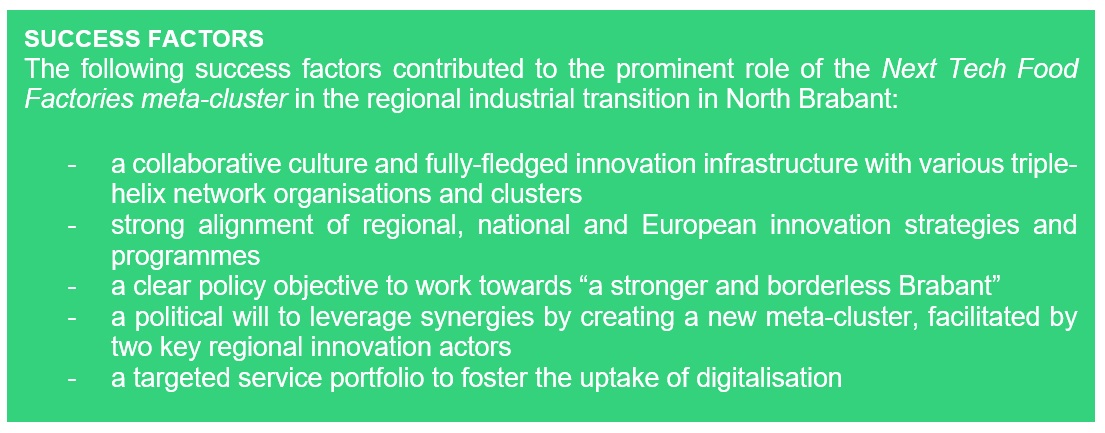
North Brabant has a fully-fledged innovation infrastructure that promotes collaboration and innovation. Various triple-helix network organisations and clusters operate at regional and sub-regional level. These organisations stimulate economic development with a regional and/or sectoral focus and, to this end, promote collaboration between knowledge institutions, authorities, and the business community. The new Next Tech Food Factories meta-cluster, a joint initiative by AgriFood Capital and Brainport Development, reflects recent policy initiatives aiming at “a stronger and borderless Brabant” as enshrined in the Brabant Agenda 2023. Since its founding in early 2023, NTFF has rapidly established itself as a key-stone actor within North Brabant’s agri-food ecosystem and developed a targeted service portfolio to foster the uptake of digitalisation in its member companies.
The case of NTFF and the North Brabant region highlights the important role of cross-sector collaboration and policy support for triple-helix network organisations and clusters. The case demonstrates how a new meta-cluster can be formed to facilitate green and digital industrial transition by exploiting synergies and merging the strength and resources of two established innovation actors. It further highlights the need for a targeted and innovative service portfolio. Finally, the case underlines the relevance of international engagement and partnering in European research and innovation projects.